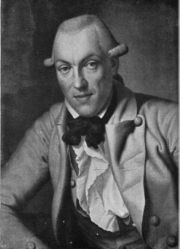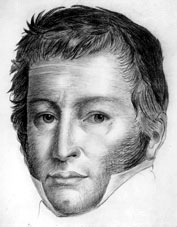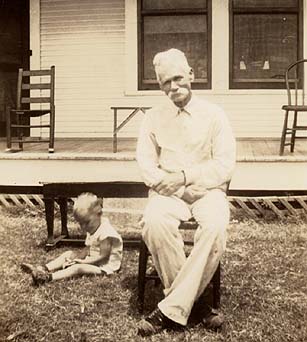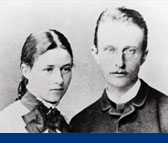|

Engel Apotheke |
The name Merck is associated with a lot of
famous people, other than you and me. Perhaps the most well known are
those connected to the world’s oldest pharmaceutical and chemical
company from Germany, Merck KGaA. In 1668, the Engel-Apotheke in Darmstadt was
purchased by Friedrich Jacob Merck (1621-1678), son of
Johann Merck (1573-1642) a bailiff from Schweinfurt. The company was turned over to his nephew upon his death, then from father to son. That
company remains Merck family property to this day. |
 |
Johann Heinrich Merck (1741-1791) was born at Darmstadt a few days after the death of his father, the chemist. He did not follow in the
footsteps of his father but became an author and critic. He established
a reputation as a military adviser and was a significant contributor to the German literary climate. He was a good friend to Johann Wolfgang von Goethe, whose genius he was first to recognize. His grandson, Heinrich Emanuel Merck, led the growth of Merck KGaA in industrial chemical production. |
 |
Heinrich Emanuel Merck (1794-1855) initiated
the move to industrial production after he took over his father’s
pharmacy in 1816. He succeeded in isolating and preparing pure
alkaloids that the scientific community was particularly interested in
due to their medical effect. Their large-scale production and exports
led to the establishment of a subsidiary, Merck & Co., in the United
States under George Merck, Sr. (1867-1926), a grandson of Heinrich
Emanuel Merck. Following the confiscation of properties after
World War I, Merck & Co. became an independent company which holds the
rights to the name in North America; outside this area the company
operates as Merck Sharpe and Dohme. In turn, Merck KGaA holds the
rights elsewhere and operates in the United States under the umbrella
brand EMD. |
 |
George W. Merck, Jr. (1894 – 1957) was an American
scientist who became president of Merck & Co. after the death of his
father, George Merck. Before World War II, he served (unpaid) on
the Munitions Board's Chemical Advisory Committee. At the height of the war
, he was an advisor to President Franklin Roosevelt who appointed him to
direct all the Government's sprawling research on biological warfare. For
this he was later awarded the Medal for Merit. Merck later acted as
a consultant to Defense Secretary Lovett. His public-duty commitments
ranged from the executive council of the American Cancer Society and the
board of visitors of the chemistry and biology departments at Harvard. He
was an early Eisenhower backer and a former state treasurer for the New
Jersey G.O.P. He founded the Vermont Forest and Farmland Foundation
which later became the Merck Forest and Farm Center, a
conservation and educational forum for agriculture and forestry. |
|
Baron Ernst von Merck (1811-1863) was a German
entrepreneur, politician and government minister. A major street, Merckstrasse, is named after him in the city of Hamburg, Germany. The Merck Planten und Blomen Park now occupies the grounds of the former zoological garden created under his leadership in 1861. Recordings of the Duke Ellington and Stan Kenton Orchestras, and others, are now sold from concerts they played at the Ernst-Merck Halle in Hamburg.
|
|
A large number of Mercks reside in South Carolina and
the Southeast part of the United States. They descend from immigrant Andrew, Balthasar and Conrad Merck families who arrived in the
United States in 1764 among a group of Palatines seeking the promise of
religious freedom. These refugees fled the war-ravaged Rhine Valley
during a period when the religion of the people was dictated by the
rulers of the state. They settled in the American colonies at a time when
English law permitted only protestants to settle in the colonies. The
favorable treatment they received in England where they first fled, plus
the free transportation and land they received when they arrived in the
colony, led many of these settlers to side with the British during the
rebellion which started just a short time after they arrived. More about
the South Carolina Palatines. |
 |
Baulser Van Buren Merck (1863-1949), born in Alabama,
was in the group who made the rush for the first homesteads in
Oklahoma. After becoming unhappy with the dust in Oklahoma, he moved to
Collegeport, Texas where he resided for over 40 years. A descendant of the the Palatine Mercks who settled in South Carolina, he was among those who migrated west. More about him. |
 |
Marie Merck (1861-1909), daughter of a Munich banker, became the wife of Max Planck on 31 March 1887. Max Planck is considered the founder of the quantum theory. He was a professor of theoretical physics at the University of Berlin. In 1918 he was awarded the Nobel Prize for Physics. His work on quantum physics and the formula now known as Planck's radiation formula was the basis for further development by Einstein, Poincare, Bohr, Dirac and others. An accomplished musician, he often would entertain guests, such as his good friend Einstein, by playing music with them at his home. Their son Erwin was executed by the Gestapo in 1945 for his part in the attempt to assassinate Hitler on 20 July 1944. |
 |
Albert W. and Katharine E. Merck, enthusiastic advocates for excellence in public and private education, have given $15 million to Harvard in 2003 to strengthen teacher training and instructional technology. The Mercks' devotion to teaching have long been dedicated to the advancement of numerous schools and universities. Albert Merck began his early career at Merck & Co., founded by his family in 1891. While serving on the company's board of directors, he earned master's degrees from Columbia University Teachers College and Rutgers University in the 1960s. He was elected to the New Jersey legislature as a Republican representative in the early 1970s, and served as the chair of the New Jersey State Board of Higher Education.
Albert Merck spent several years teaching political science at Rutgers and Drew universities. He has been a trustee of the Bonnie Brae School for Boys, Newark State College (now Kean College), Westminster Choir College, Drew University, and St. George's School. The Mercks have also been generous supporters of Katharine Merck's alma mater, Bennington College, to which they donated a total of $15 million in 2002 and 2004. (From articles in Harvard University Gazette, 3 June 2003, and collegenews.org, 9 Aug 2004) |
 |
John W. Merck, Jr., is a Lecturer and Associate
Director of the Earth, Life and Time Program at the University
of Maryland. He describes himself as a morphology-based vertebrate
systematist and paleontologist. He was born in Athens, Georgia. See his website. |
|
|